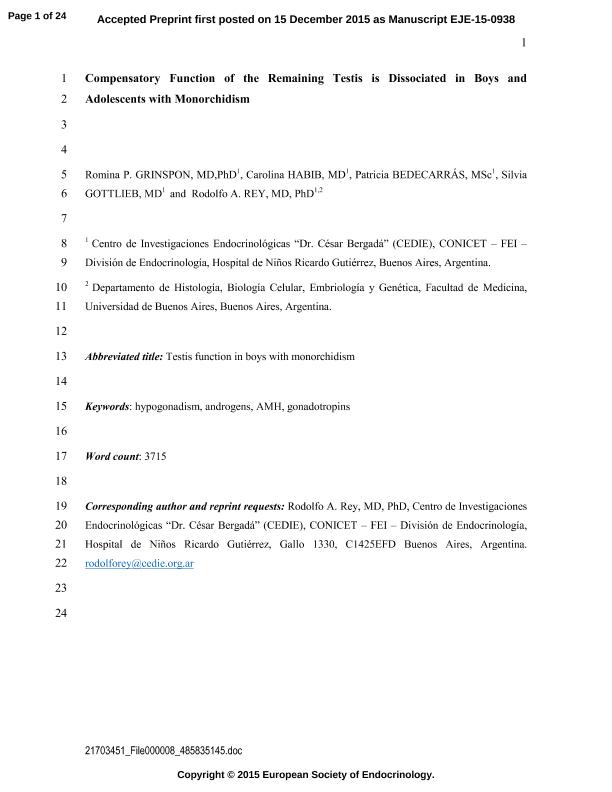Artículo
Compensatory function of the remaining testis is dissociated in boys and adolescents with monorchidism
Grinspon, Romina ; Habib, Carolina; Bedecarras, Patricia Gladys
; Habib, Carolina; Bedecarras, Patricia Gladys ; Gottlieb, Silvia Elisa
; Gottlieb, Silvia Elisa ; Rey, Rodolfo Alberto
; Rey, Rodolfo Alberto
 ; Habib, Carolina; Bedecarras, Patricia Gladys
; Habib, Carolina; Bedecarras, Patricia Gladys ; Gottlieb, Silvia Elisa
; Gottlieb, Silvia Elisa ; Rey, Rodolfo Alberto
; Rey, Rodolfo Alberto
Fecha de publicación:
03/2016
Editorial:
BioScientifica
Revista:
European Journal of Endocrinology
ISSN:
0804-4643
e-ISSN:
1479-683X
Idioma:
Inglés
Tipo de recurso:
Artículo publicado
Clasificación temática:
Resumen
Objective: Compensatory hypertrophy has been classically described in patients with monorchidism. However, it remains unclear whether there is a functional compensatory activity of the different cell populations. Our aim was to assess the functional capacity of the solitary testis in monorchid males from infancy through puberty in order to determine whether the remaining gonad is capable of compensating the functional activity of Sertoli and Leydig cells of the absent gonad. Design: In a retrospective, cross-sectional, analytical study performed at a tertiary paediatric public hospital, we included 89 boys with monorchidism and 358 healthy controls, aged 6 months-18 years. Testicular volume and circulating levels of reproductive hormones were compared between patients with monorchidism and normal boys. Serum anti-Mullerian hormone (AMH) and FSH were used as biomarkers of the functional mass of prepubertal Sertoli cells, whereas serum testosterone and LH were used as biomarkers of Leydig cells. Results: In the vast majority of the cases, the testicular volume of monorchid boys was smaller than the sum of the volume of both testes of healthy controls. Serum AMH was lower and FSH was higher in patients with monorchidism than in controls aged <3 and >13 years. Serum testosterone and LH did not differ significantly between patients and controls. Conclusion: In boys and adolescents with monorchidism, there is a dissociated capacity of the remaining testis to compensate for the absence of the other gonad: while Leydig cell function is largely compensated, Sertoli cell proliferation and function was lower than in controls.
Palabras clave:
Monorchidism
,
Sertoli Cell
,
Hipogonadism
Archivos asociados
Licencia
Identificadores
Colecciones
Articulos(CEDIE)
Articulos de CENTRO DE INVESTIGACIONES ENDOCRINOLOGICAS "DR. CESAR BERGADA"
Articulos de CENTRO DE INVESTIGACIONES ENDOCRINOLOGICAS "DR. CESAR BERGADA"
Citación
Grinspon, Romina; Habib, Carolina; Bedecarras, Patricia Gladys; Gottlieb, Silvia Elisa; Rey, Rodolfo Alberto; Compensatory function of the remaining testis is dissociated in boys and adolescents with monorchidism; BioScientifica; European Journal of Endocrinology; 174; 3; 3-2016; 399-407
Compartir
Altmétricas



